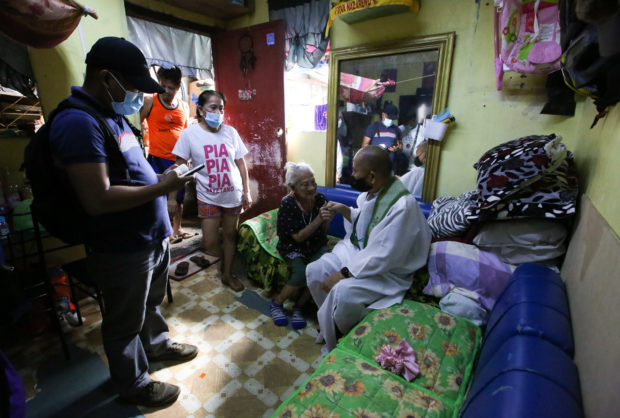Home visits bring parish ‘ayuda’ to the aged
MANILA, Philippines — At home in the densely populated informal settlement called “Boracay” on Maunlad Street in Barangay Pinyahan, Quezon City, Lourdes Huertas gripped the hands of the parish priest who had come to visit.
The frail 98-year-old had been cooped up at home even before the lockdown began in March, her family members anxious that she not go outdoors for her own protection.
Huertas had not heard Mass since 2017, said her daughter-in-law Josie. “She can’t watch online Masses due to her weak eyesight. It’s the first time she has been visited in her house by a priest.”
Fr. Robert Reyes of San Isidro Labrador Parish had been visiting the elderly and sick every Saturday since the third week of September, in response to requests from the faithful.
Under the community quarantine that has been in effect for seven months and counting, senior citizens or those age 60 onward are deemed highly vulnerable to contracting the COVID-19 virus and are discouraged from leaving their homes.
In visiting Huertas, the activist priest was accompanied by a seminarian, Bro. Arvin Zarsata, and a prominent physician, Dr. Eduardo Ranillo Gatchalian. The physician’s wife, Dr. Sally Gatchalian, an expert in infectious diseases and pediatric medicine, was an active member of the parish until her death due to COVID-19 on March 26.
Article continues after this advertisement
VISITING SHEPHERD Lourdes Huertas (center) holds the hand of her shepherd, Fr. Robert Reyes of the San Isidro Labrador Parish, during his visit to the home she shares with family members. Bro. Arvin Zarsata (left) is present to assist in the rituals. —LYN RILLON
Feeling the love
The three men wore face masks during the visit, as in every other house call they had made, and brought “ayuda” (assistance) — a bag of rice and canned goods.
Article continues after this advertisementAfter receiving absolution and a blessing, Huertas repeatedly thanked Reyes for coming to see her and embraced him tightly as he was leaving. Zarsata, who had assisted in giving her communion, blinked back tears.
A floor below, Jesus and Conchita Santelices, both in their 70s, welcomed the priest and his companions to their own home.
“We feel lighthearted. We really feel his love for us,” Conchita said, adding that the last Mass they had attended was last year’s “Simbang Gabi.”
In another house, Crisanto Aberia, 84, lay unresponsive on a thin cot on the second floor. His wife Amparo, 81, said he had been bedridden for a year due to prostate and kidney afflictions.
“We can’t bring him to the hospital because we are worried he will get COVID-19,” said Amparo, a retired schoolteacher.
As Reyes prayed over and blessed Crisanto with holy water, Gatchalian quietly asked Amparo about her husband’s condition. The 67-year-old former president of the Philippine associations of surgeons and of urologists scribbled a prescription to help improve Crisanto’s urination and advised Amparo to seek assistance from the barangay to take her husband to a hospital.
“He’s really weak and he will not be able to withstand any form of treatment,” Gatchalian said of Crisanto. “Usually there should be home care, but this is impossible because nobody can bring him out of the house and they can’t afford to pay a doctor to do a home visit.”
Feeling valued
“There are no more primary health-care workers who go from house to house,” Gatchalian observed.
Amparo said she missed attending Mass at the parish church, which she used to do every day in the morning and afternoon.
“Father Reyes’ visit is important to us old people because even if we cannot go to church, we feel valued. His visits would also encourage younger people to go to church,” she said.
Amparo said she appreciated her children’s reasons for requiring her to stay home during the pandemic. However, “I am not happy,” she said. “You are kept safe inside, but you do not have the enjoyment of being among your brethren in church.”
As the visitors were leaving, Amparo tried to hand Reyes a wad of bills amounting to P500. The priest refused to take the money, saying that the couple needed it more.
Reyes, 65, said he understood the good intentions behind restricting older people to their homes. But this takes a gradual toll on their mental and emotional well-being, he pointed out.
“I realized why I felt as isolated,” Reyes said. “It’s because the majority of my parishioners are elderly, and they disappeared.”
The Church’s survival
Churches and other places of worship were closed to the public under the community quarantine. More than six months later, physical attendance at Masses is still limited.
Reyes wondered: What will happen in a community if the priest himself becomes afraid of going outdoors because of fear of infection? He answered himself: The Church can become so concerned about its own survival that it will sacrifice the very essence of its task.
To counter this fear and the isolation, people must find a way to serve, inspire and support others in spite of the lockdown and attendant prohibitions, Reyes said.
“If you cannot serve directly, look around the community and see what can be done to help others. There are many ways to help. You can support financially, give food, or give a good word,” he said.
For more news about the novel coronavirus click here.
What you need to know about Coronavirus.
For more information on COVID-19, call the DOH Hotline: (02) 86517800 local 1149/1150.
The Inquirer Foundation supports our healthcare frontliners and is still accepting cash donations to be deposited at Banco de Oro (BDO) current account #007960018860 or donate through PayMaya using this link.